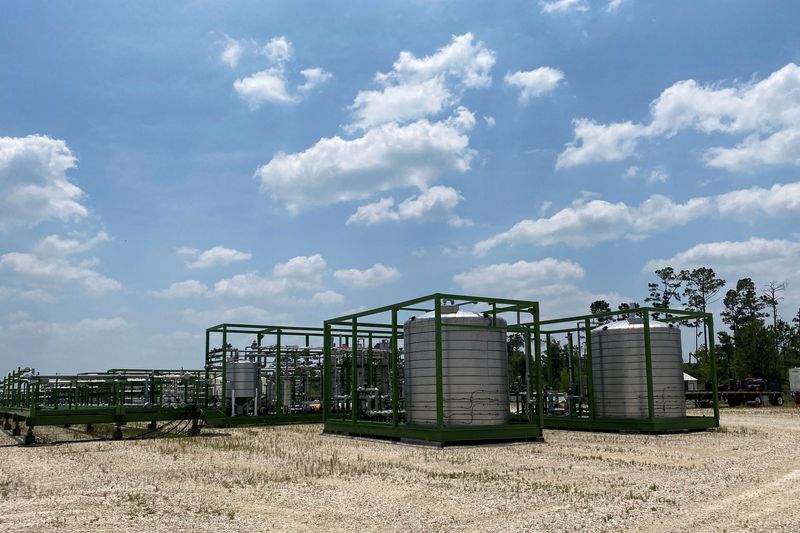(This July 11 story has been officially corrected to fix the companies' production run rate in a bullet and in paragraphs 1-3 and corrects royalty information in paragraph 16)
By Ernest Scheyder
HOUSTON (Reuters) - International Battery Metals said this week it has launched its version of a novel type of lithium filtration technology, a move that could help usher in cheaper and faster supplies of the electric-vehicle battery metal.
At a site in rural Utah controlled by privately-held US Magnesium, IBAT said it has started its own direct lithium extraction (DLE) technology and aims to ramp up production to an annual rate of nearly 5,000 metric tons within four weeks. Both companies declined to provide the current production rate.
The company, which developed its DLE plant to be portable, has been competing with Standard Lithium, SLB, Rio Tinto (NYSE:RIO), Eramet and others to be first to commercial production, a goal sought by industry investors, analysts and customers.
IBAT said it considers this week's launch to be the start of commercial DLE production. Industry consultants generally consider that mark reached at annual production levels of 5,000 metric tons or greater and at consistent quality levels.
The DLE industry is expected to grow within a decade into an industry with $10 billion in annual revenue by transforming the speed and efficiency of lithium production for EV manufacturers and others, analysts said, much the way that fracking and horizontal drilling helped boost U.S. oil production.
Lithium has historically been produced with evaporation ponds, which are used to extract the metal from those brines, or open-pit mines, which are used to remove it from hard rock deposits. The intensive water use and physical footprint of those methods, as well as their long development and production times, sparked the hunt for a third option.
While DLE technologies vary, they are comparable to common household water softeners and aim to extract about 90% or more of the lithium from brines, compared to about 50% using ponds.
IBAT's step coincides with a more than 80% drop in lithium prices in the past year, fuelling layoffs at industry leader Albemarle (NYSE:ALB), DLE upstart Lake Resources and others. Still, IBAT plans to build more of its plants and market them for use across the globe.
STRATEGY
IBAT's strategy has focused on building relatively small plants.
While rivals have tried for more than a decade to commercialize DLE, their plans involved production volumes of 20,000 tons per year or more at permanent facilities often in remote regions where labor and supplies are difficult to procure.
Houston-based IBAT designed and built a 450-foot-long (137 meter) portable plant in Louisiana that it moved in 13 parts to the US Magnesium site, which draws brine from the Great Salt Lake. IBAT processes brines from a US Magnesium tailings waste facility.
Additional plants can be added and stacked like Lego bricks to boost production in 5,000-ton-per-year increments. It takes 18 months to build an IBAT plant and reach production, the company said.
Each plant, which is smaller than three acres (1.2 hectares), is designed to move in the future to a new deposit for reuse, saving construction costs. IBAT's lithium chloride plant costs $50 million to $60 million each, depending on several factors. US Magnesium uses IBAT's lithium chloride to make lithium carbonate for potential sale to battery makers.
Paris-based Eramet spent nearly $900 million on its own DLE project that aims to come online this year in Argentina with lithium carbonate production after more than a decade of development.
Ron Thayer, president of US Magnesium, said he chose IBAT's process because of its portability as well as the type of absorption material that IBAT's process uses to filter lithium from brine, which Burba developed.

US Magnesium plans to begin paying IBAT a royalty once it starts selling the project's lithium. "I consider (IBAT) a commercial lithium producer," Thayer said.
Exxon Mobil (NYSE:XOM), which is developing a lithium project in Arkansas, has considered using IBAT's technology, Reuters has reported.